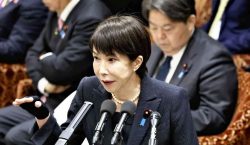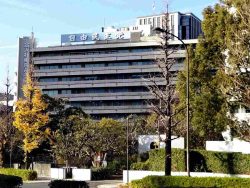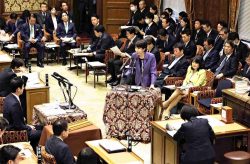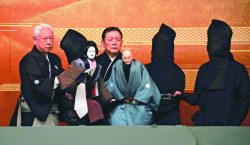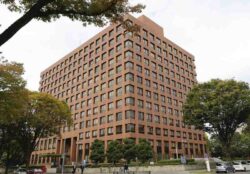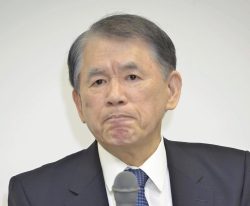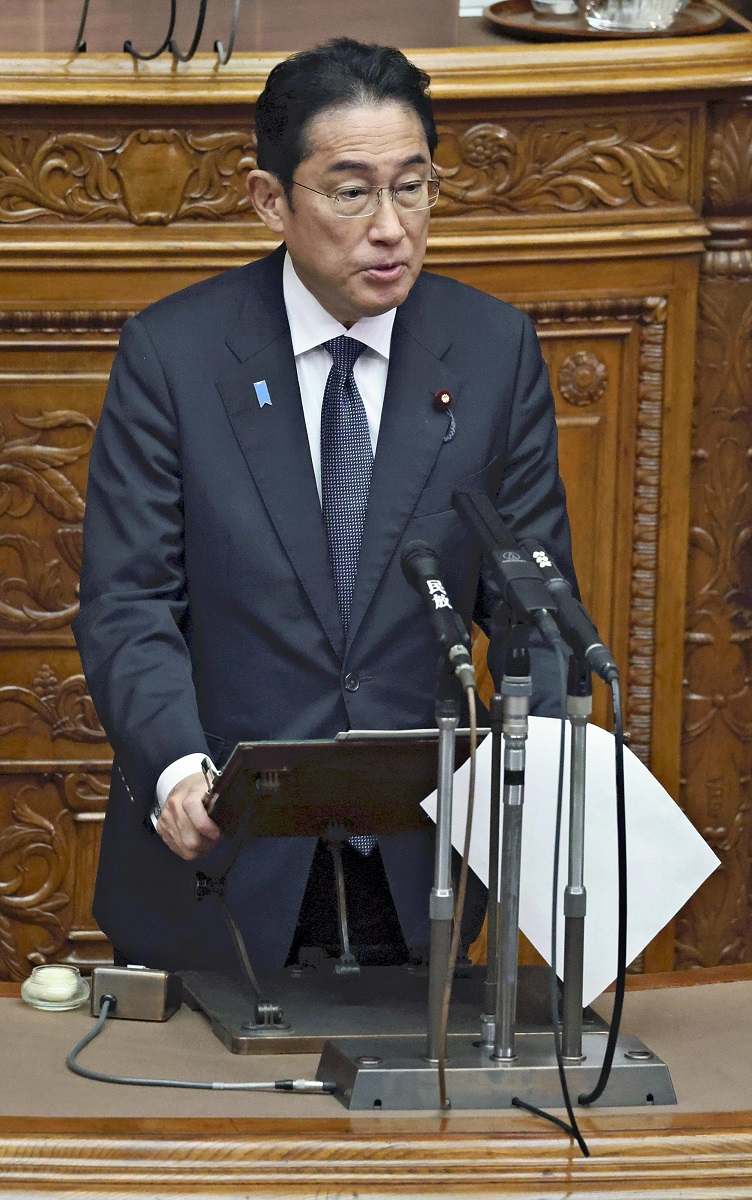
Prime Minister Fumio Kishida speaks at a plenary session of the House of Councillors on Monday afternoon.
18:03 JST, December 12, 2023
Prime Minister Fumio Kishida may find it difficult to replace all members of the ruling Liberal Democratic Party’s Abe faction who hold key positions in the government and the party in the wake of allegations that some of them received off-the-books kickbacks from political party fundraising revenue.
While such a move could help Kishida address the allegations, finding successors for numerous key posts presents a high hurdle, and the measure could trigger opposition from the Abe faction, the largest faction within the LDP.
Entire faction involved
“We’ll try to identify the causes of the problem and the issues to be addressed, and take necessary measures to restore public trust,” Kishida said at a plenary session of the House of Councillors on Monday.
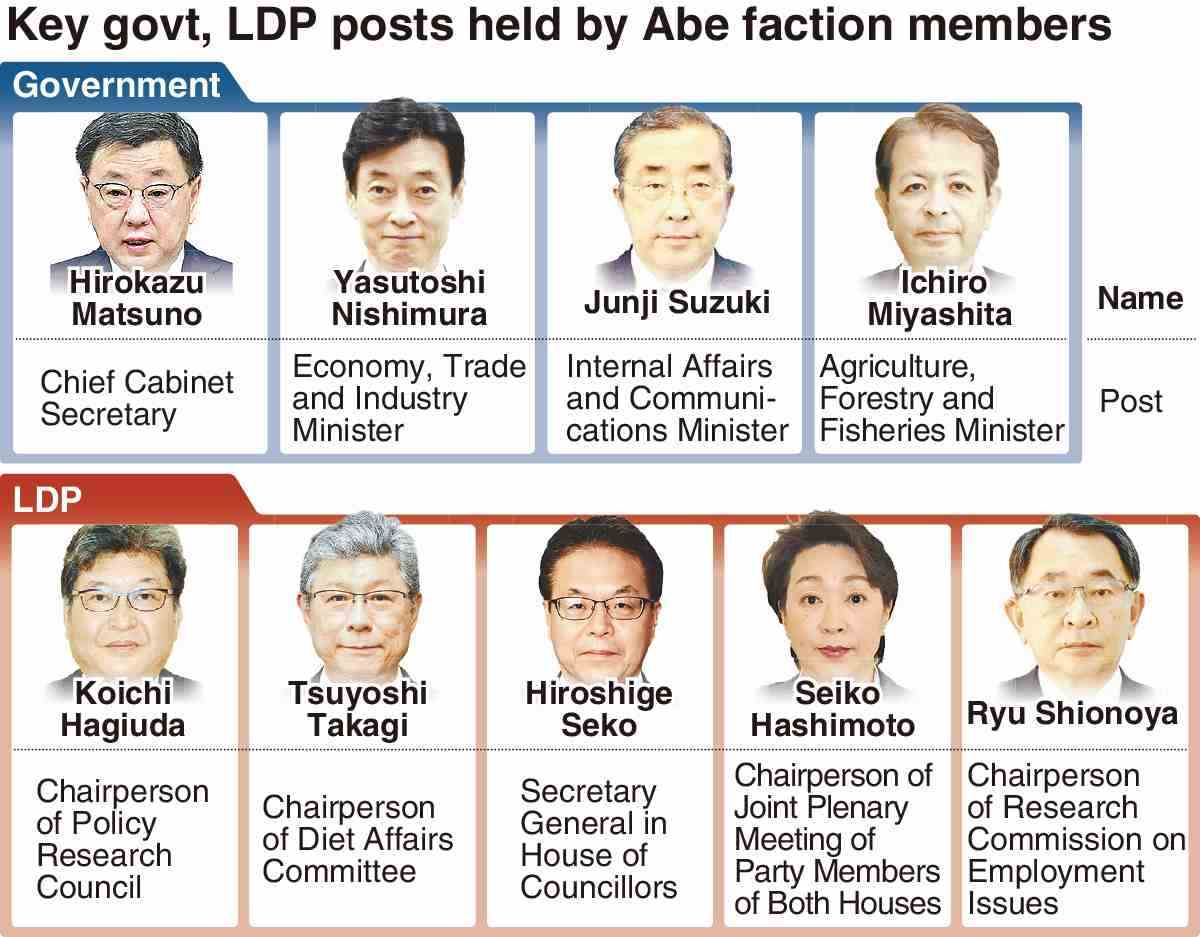
One of these “measures” apparently involves replacing all Abe-faction lawmakers who hold executive positions within the LDP or one of the top-three ministry positions — minister, state minister or parliamentary vice minister.
Members of the Abe faction suspected of having received kickbacks are not limited to the faction’s five senior members: Chief Cabinet Secretary Hirokazu Matsuno; Economy, Trade, and Industry Minister Yasutoshi Nishimura; Koichi Hagiuda, chairperson of LDP’s Policy Research Council; Tsuyoshi Takagi, chairperson of LDP’s Diet Affairs Committee and; Hiroshige Seko, secretary general of the House of Councillors.
Dozens of other members of the 99-member faction, including former Olympic minister Seiko Hashimoto, also are alleged to have received large kickbacks.
“It’s unavoidable that the entire Abe faction has been involved in the kickback issue,” said a former Cabinet member who belongs to another faction. “No member of the Abe faction should hold a key position,”
Kishida separately met with LDP Secretary General Toshimitsu Motegi and LDP General Council Chairperson Hiroshi Moriyama on Sunday at the Prime Minister’s official residence to discuss the en-masse replacement plan. However, they failed to reach a conclusion.
“While some news reports say we plan to collectively deal with a certain party faction, such reports are not necessarily true,” Motegi said at a press conference on Monday.
Many challenges ahead
There are many issues with the en-masse replacement plan. The faction includes four Cabinet ministers, five state ministers and six parliamentary vice ministers, some of whom have been confirmed as not having received kickbacks. In light of these circumstances, some party members say sacking all Abe faction lawmakers in key positions is going too far.
Replacing members in nearly 20 posts would likely prove difficult. “There’s no need to replace people in all the posts,” Kishida reportedly told his close aides.
Currently, it is impossible to distinguish between prosecutable and non-prosecutable cases. As such, some have pointed out that if Kishida were to replace all Abe faction members in key positions and other factions later become subject to the investigation, Kishida might be forced to conduct another large-scale reshuffle. “I wonder if the Abe faction alone should be blamed for the problem?” a senior member of Komeito mused.
Different degree of interest
Some doubt that Kishida can dismiss all Abe-faction members who hold key positions in the government and the LDP.
Some on the prime minister’s side expect affected Abe faction members to voluntarily resign. However, the faction — previously led by late former Prime Minister Shinzo Abe — lacks a leader or an individual capable of coordinating efforts to persuade holders of key positions to resign en-masse.
During a Sunday meeting with Hagiuda at a Tokyo hotel, Kishida reportedly said, “I want you to deal decisively with important issues such as the tax system and the budget.” This suggests Kishida is keen for Hagiuda to stay in his current post, at least until the end of the year.
But talking with reporters on Monday, Hagiuda said, “If it comes to a situation in which Cabinet ministers and vice ministers start stepping down, I should bear a heavier responsibility than the resignees.” Hagiuda also suggested that he would resign at the same time as Cabinet ministers and others.
“If we’re no longer able to assume key positions in the government and the party, it feels like oppression, and we no longer need to support the Kishida administration,” a senior Abe faction member said.
Top Articles in Politics
-

Japan PM Takaichi’s Cabinet Resigns en Masse
-

Sanae Takaichi Elected Prime Minister of Japan; Keeps All Cabinet Appointees from Previous Term
-

Japan’s Govt to Submit Road Map for Growth Strategy in March, PM Takaichi to Announce in Upcoming Policy Speech
-

LDP Wins Historic Landslide Victory
-

LDP Wins Landslide Victory, Secures Single-party Majority; Ruling Coalition with JIP Poised to Secure Over 300 seats (UPDATE 1)
JN ACCESS RANKING
-

Producer Behind Pop Group XG Arrested for Cocaine Possession
-

Japan PM Takaichi’s Cabinet Resigns en Masse
-

Man Infected with Measles Reportedly Dined at Restaurant in Tokyo Station
-

Israeli Ambassador to Japan Speaks about Japan’s Role in the Reconstruction of Gaza
-

Videos Plagiarized, Reposted with False Subtitles Claiming ‘Ryukyu Belongs to China’; Anti-China False Information Also Posted in Japan


